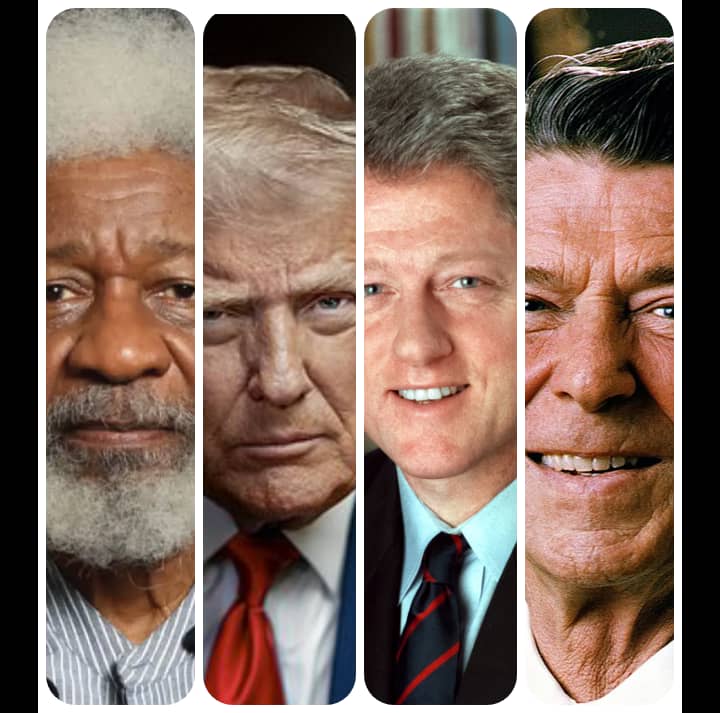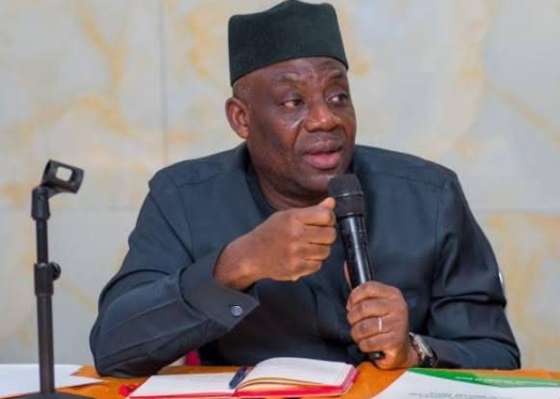By Dr Uzor Ngoladi
In a move that has drawn wide public attention, the United States, under the administration of President Donald Trump, revoked the visa of Nigeria’s literary giant and Nobel Laureate, Professor Wole Soyinka. For many across the globe, this decision evoked both shock and irony, that a man whose voice has echoed for decades in defense of freedom, democracy, and human dignity would face such a restriction from a nation that prides itself as the bastion of liberty.
Yet, as history shows, this is not the first time that America has turned its back on intellectuals whose ideas challenge power.
At 91, Wole Soyinka’s name is synonymous with literary brilliance and fearless advocacy. The first African to win the Nobel Prize in Literature in 1986, Soyinka has been a global ambassador of truth, unafraid to speak against tyranny whether military or democratic. His works such as The Man Died, Kongi’s Harvest, and Death and the King’s Horseman are not just art; they are timeless indictments of oppression.
But Soyinka’s activism has often put him at odds with the powerful. During Nigeria’s military dictatorship, he was imprisoned for 22 months under General Yakubu Gowon for advocating dialogue during the Biafran War. In exile, he continued to speak against authoritarianism across Africa and the world.
That such a man — a teacher, thinker, and defender of justice — would have his U.S. visa revoked under Trump’s America is both symbolic and telling of the ideological tides that swept through Washington during that era.
The incident mirrors a historical precedent from the 1980s, during the presidency of Ronald Reagan. Then, another Nobel Laureate, the Colombian novelist Gabriel García Márquez, famed author of One Hundred Years of Solitude, found himself banned from entering the United States.
Márquez’s “offense” was his political affiliation and friendship with revolutionary figures such as Fidel Castro of Cuba. The Reagan administration, steeped in Cold War paranoia, saw Márquez not as an artist, but as an ideological adversary.
Yet, history turned. When Bill Clinton became president in 1993, the U.S. government reversed its position. Márquez, once deemed a threat, was not only welcomed back but invited to the White House to dine with the president himself. The same writer who was ostracized under one administration became a guest of honor under another.
What these two episodes — Soyinka’s visa revocation and Márquez’s travel ban — reveal is a recurring tension between political power and intellectual independence. Writers and thinkers often stand at the crossroads of politics and morality. Their words transcend borders, their influence often unsettling to governments that view dissent as danger.
For Trump’s America, whose policies on immigration and international relations were defined by nationalism and populism, Soyinka’s intellectual cosmopolitanism and outspoken views may have seemed inconvenient. His criticisms of Trump’s politics particularly on racial issues and global leadership were public and pointed.
Yet, the irony is unmistakable. The United States, a nation that honors the likes of Mark Twain and Maya Angelou for their courage to speak truth to power, was silencing one of the world’s greatest literary voices — not through censorship, but by closing its doors.
Across history, governments democratic and autocratic alike have sought to suppress thinkers who challenge the status quo. In the 1950s, American playwright Arthur Miller faced persecution during the McCarthy era for his alleged communist sympathies. In apartheid South Africa, writers like Nadine Gordimer and Dennis Brutus were banned for their anti-regime writings.
In every age, the writer stands as society’s conscience, holding a mirror to power. Soyinka, like Márquez before him, belongs to this lineage of intellectuals whose moral courage transcends politics.
To revoke a visa is not merely to deny entry; it is to symbolically shut the door on dialogue, exchange, and understanding. Yet, as history has shown, such acts seldom diminish the power of ideas.
When Gabriel García Márquez was banned, his books continued to be read in universities across America. When Wole Soyinka was silenced by Nigeria’s military dictators, his words still found their way into the hands of readers and students who drew inspiration from his defiance.
Soyinka’s own response to adversity has always been one of calm resilience. “Even this,” he might say, “shall pass.” The winds of politics change, but truth endures.
Lessons from the Past
The Clinton-Márquez reconciliation holds a vital lesson. Political climates shift. What one government deems “undesirable,” another may celebrate. The same America that once blacklisted intellectuals like Charlie Chaplin and Paul Robeson later honored them posthumously.
Thus, Soyinka’s visa revocation, though regrettable, may someday be reversed perhaps under a future administration more tolerant of critical voices. Indeed, given Soyinka’s global stature, it is likely only a matter of time before America reopens its doors, if only to affirm its own democratic ideals.
Through all seasons of censorship and exile, Soyinka’s pen has never faltered. His essays, poems, and plays continue to confront the forces of corruption, bigotry, and injustice. Whether in Nigeria, the United States, or on the world stage, Soyinka remains a citizen of the world — bound not by passports, but by principles.
The revocation of his visa is therefore not a personal loss, but a moment of reflection for America — a reminder that democracy must be defended not only at home but in the spirit of global intellectual exchange.
For Soyinka, the struggle for human dignity transcends borders. His life’s journey from the dusty streets of Abeokuta to the world’s grandest literary stages is proof that ideas, once born, cannot be contained.
And so, just as Reagan’s ban on Márquez gave way to Clinton’s embrace, Trump’s America may have turned its back on Soyinka but history, as always, will turn forward.
For a nation that once welcomed Albert Einstein, Maya Angelou, and Chinua Achebe, it is unthinkable that Wole Soyinka teacher, poet, conscience of Africa should be unwelcome. But the tides of politics are transient. The arc of history bends, inevitably, toward justice and enlightenment.
In the end, Soyinka’s words, not his visa status, will endure. The classrooms, libraries, and minds he has shaped across continents stand as living testaments to a truth larger than any border control that ideas cannot be deported.
Yes, even this too shall pass.
Dr Uzor Ngoladi is the publisher of DailyBlastNG & UzorNgoladi.com. He is the Secretary General of Forum of South-EaST Academic Doctors (FOSAD)



